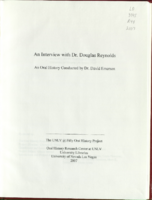Search the Special Collections and Archives Portal
Search Results

Transcript of interview with Dr. Douglas Reynolds by Dr. David Emerson, June 16, 2006
Date
Archival Collection
Description
Text
Patricia Carmichael Craddock oral history interview
Identifier
Abstract
Oral history interview with Patricia Carmichael Craddock conducted by Joe Schneider on March 2, 1980 for the Ralph Roske Oral History Project on Early Las Vegas. Patricia Carmichael Craddock first discusses growing up in Las Vegas, Nevada where she became a teacher, the educational system in Nevada, and her colleagues. Craddock also discusses the changes to Las Vegas and how other people outside of Las Vegas perceived the city during that time. She later mentions Helldorado and the types of recreational activities available to young people during her time.
Archival Collection
Joan Olson Griffith oral history interview
Identifier
Abstract
Oral history interview with Joan Olson Griffith conducted by Sharee Schrader on April 12, 2005 for the History of Blue Diamond Village in Nevada Oral History Project. Griffith begins by discussing why she moved to Blue Diamond, Nevada with her family due to job opportunities at the Blue Diamond Plant, where they manufactured wallboard, in 1956. She describes life in Blue Diamond and rural Nevada, the education available in the village, and Blue Diamond's proximity to Bonnie Springs Ranch and structures made for the filming of Western themed media. Griffith concludes by discussing how Blue Diamond has changed since the 1950s and being a Sunday school teacher for eighteen years.
Archival Collection
Sandra F. Mack oral history interview
Identifier
Abstract
Oral history interview with Sandra F. Mack conducted by Claytee D. White on March 29, 2018 for the African Americans in Las Vegas: a Collaborative Oral History Project. In this interview, Mack discusses her early life in Seattle, Washington. She talks about her education in home economics, becoming a teacher, and her experience teaching during segregation. Mack recalls moving to Las Vegas, Nevada in 2001, and her involvement with community organizations 100 Black Women, the Las Vegas Branch of The National Association for the Advancement of Colored People (NAACP), the Urban League Guild, and the local Delta Sigma Theta chapter. Lastly, Mack talks about the 1 October shooting, gun violence, the increase of security at churches.
Archival Collection
Yves Auriol oral history interview, 2024 June 21
Level of Description
Scope and Contents
Oral history interview with Yves Auriol conducted by Stefani Evans and Claytee D. White on June 21, 2024 for Game On! The Oral History of Las Vegas Sports project. In this interview, Auriol describes his childhood in Toulouse, France during World War II. The third oldest of seven children, Auriol learned the art of fencing from his brother. He graduated in 1955 from Lycee de Toulouse where he earned a master's degree as a fencing master from the Institute National du Sport in Paris. Eventually, he became a top fencing teacher in the sport, and in 1971 he followed his brother to the United States. Auriol served as head women's fencing coach at Notre Dame from 1985-95 and assumed head coaching responsibilities for the men's and women's programs in 1996. He developed into one of the most successful and respected coaches in the nation, and is a three-time Olympic coach. Digital audio and photographs available.
Archival Collection
Collection Name: Game On! The Oral History of Las Vegas Sports Interviews
Box/Folder: Digital File 00
Archival Component
Chretien, Jeanne Pursel, 1923-
Jeanne P. Chretien was born August 07, 1923 in Marshalltown, Iowa. She moved to Las Vegas, Nevada in 1939. She held careers as a telephone operator, an English teacher, and an English department head in Las Vegas.
Person
Geran, Trish
Trish Geran was born on January 26, 1961 in Las Vegas, Nevada. She went to Bishop Gorman High School and to the University of Nevada, Las Vegas. As of 2015, she was a subsitute teacher, author, and activist.
Person
Page, John J.
John J. Page was born on Janruary 21, 1931 in Osage County, Oklahoma to Kathleen and Loy Page. He married Reitha Lee Page on May 02, 1952. They moved to Las Vegas, Nevada in February of 1959. He was a elementary school teacher.
Person
Leigon, Richard A., 1949-
Richard A. Leigon was born in Boulder City, Nevada. He worked for his father in the International Brotherhood of Electrical Workers. Richard was an active member of Local 357 and talks about his work as a metaphysical practictioner and teacher while living in Nevada.
Person
